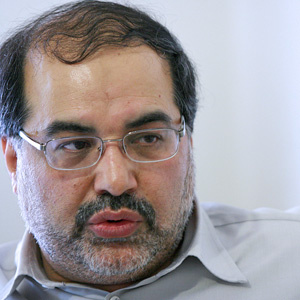Iranian Diplomacy is Passive

IRD: Hariri's remarks last Thursday, in which he accused Iran of interfering in the Arab countries were reflective. He stated, "We do not accept that Lebanon be supported by Iran; we are also not pleased that our brothers in Bahrain or Kuwait or any other countries are supported by Iran." These statements were followed by the reaction of Iran and Hezbollah. The reasons to adopt a position are discussed in an interview with Masoud Edrisi, Iran’s former ambassador to Lebanon.
IRD: A few months ago, Mr. Ahmadinejad visited Lebanon, and Hariri's stance toward Iran seemed very friendly after that. However, the allegations of Mr. Hariri last week were completely different. What was the reason of this shift in Saad Hariri’s discourse regarding Iran?
ME: I think the root of Mr. Hariri's stance on Iran and Hezbollah is the fall of his cabinet. Saad Hariri considers the fall of his government initiated by Hezbollah, and Hezbollah’s relations with Iran. So it is natural that his critical attacks both on Hezbollah and Iran have increased, too. It is one aspect of the changes in his tone and positions.
From the other viewpoint, it should be noted that Mr. Hariri's ties to Saudi Arabia are quite clear and that affects his position. Now the Saudi stance towards Iran, whether about Bahrain and other countries or other regional issues in general, is not positive. So it is natural that considering his dependency on Saudi Arabia, Mr. Hariri follows their positions. I think they are two main reasons for the recent positions of Mr. Hariri on Hezbollah and Iran.
IRD: Did the democracy seeking movements of the people in Arab countries, and the fall of the dictator regimes, affect Saad Harir’s position?
ME: It should be noted that Lebanon’s situation is different from all other Arab countries: democracy has been established in Lebanon. Neither Hariri nor Lebanese authorities are like other regional authorities. The Lebanese government is formed based on the parliamentary system and a democracy consensus, and continues to operate. Therefore, if some changes are being made in Arab countries or popular protests against the ruling systems are being organized, they are not that influential on Lebanon.
However, the impact of these developments on Mr. Hariri's allies is apparent. These changes can be very influential in Saudi Arabia, Mr. Hariri’s ally, and that is why Hariri worries. The same is true of the developments in Egypt: Hosni Mubarak was one of those who strongly supported the position of Hariri. The change in the Egyptian government has caused Hariri to lose one of his important allies.
These issues cause Mr. Hariri worry, but because of the democracy in Lebanon, there are some concerns that the uprising might spread throughout Lebanon.
IRD: Due to the recent stance of Saudi Arabia against Iran, can it be claimed that there is a cold war between Iran and Saudi Arabia?
ME: Yes, it is so. It seems now that the relations between Iran and Saudi Arabia are in their worst and coldest condition since the revolution, and they can be interpreted as a cold war. I think, even during the war, the Saudis did not adopt such a position against Iran.
These circumstances were dictated by both Iran and Saudi Arabia and without any political considerations; they raised all kinds of criticisms about each other, and it is a very bad situation.
IRD: Small countries like Oman, Qatar, and Kuwait that previously cooperated more with Iran, now have good relations with the Saudis. Do you consider this as a weakness in Iranian diplomacy, or are other factors effective in these circumstances?
ME: I think this evolution also refers to the weakness of our diplomacy, and other factors. Namely, we could act better in our diplomacy and not let countries like Qatar and Oman- that always had good relations with us- incline toward Saudi Arabia.
Apart from the weakness of the diplomacy, the dependencies of the Arab countries on each other are also effective in their positions. But the main issue is that we should have strong and active diplomacy to gain the confidence of these small countries, and not let Saudi Arabia or other countries take them away from us and absorb them.
IRD: What do you mean by active diplomacy? What should be done now?
ME: In diplomacy there are different ways to reduce stress and gain the trust of other countries. One way is meeting and negotiating, or sending messages directly or indirectly that prevent the conversion of friendly relations into unfriendly ones. Unfortunately, we do nothing to stop these developments and the unfriendly relationships; that is our greatest weakness.

